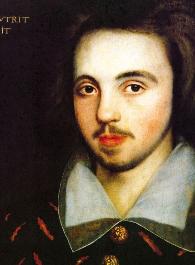| Christopher Marlowe |

Why the case for Marlowe is different
If
Shakespeare did not write the plays and poems attributed to him,
admittedly a huge if, there is only one candidate who can step in and fill the void. Christopher Marlowe was not only a recognized poet and playwright working in the period immediately before the debut of "Shakespeare," it was Marlowe who actually created "Shakespearean drama."
Unlike
any other candidate, only with Marlowe do we have the demonstrated ability to write poems and plays at a Shakespearean level. Two centuries of scholarship reveal a startling consensus - the
writer of the Shakespeare plays shows an obvious affinity for the work, style, and sound of Marlowe. Book after book attempts to explain this remarkable similarity as Shakespeare's emulation of Marlowe, his re-writing of Marlowe's work, or his collaboration with Marlowe.
Read en masse, there is something a little startling in these refrains. The possibility that the similarity of the two bodies of work is evidence of a single authorship, by contrast, has a harmony and a simplicity that eliminates all of the tortured logic found in the traditional biographies.
The biggest problem with the Marlowe case is, ironically, also its biggest asset. Marlowe was reported killed on May 30, 1593, while facing accusations of atheism, blasphemy, and treason. We believe the evidence shows that Marlowe escaped into exile and assumed a new identity to avoid a possible death sentence. That the first mention of Shakespeare as a writer occurs within less than a month of his disappearance is therefore not a coincidence.
Marlowe
The only writer with the proven
ability to write poetry and dramatic verse at a "Shakespearean" level. For two centuries, scholars have proclaimed that Shakespeare learned how to write by studying Marlowe's style. Speculation that they were friends and shared manuscripts is prompted by the striking similarity of Marlowe's later works to Shakespeare's early works.

Who was Christopher Marlowe?
Click
here to read about Marlowe's life and work.
Why do we think that Marlowe did not die in 1593?
Click
here to learn about what we call "The Great Puzzle" of Marlowe's death.
Think the idea of faking
one's own death is unusual?
Click
here to find out how common it actually is.
What do Shakespeare
scholars say about Marlowe?
Click
here to read opinions about Marlowe's influence in the Shakespeare plays.
Is there a problem with
Shakespeare?
Click
here to learn why we at the
IMSS are
sceptical that Shakespeare was a writer.
What happened to Christopher Marlowe on May 30, 1593?
Was Marlowe killed by Ingram Frizer (the servant of Marlowe's patron Thomas Walsingham), while trying to protect himself from Marlowe's attack, as the Coroner's report states?
Was Marlowe lured to the meeting in Deptford to be murdered by Frizer, Robert Poley, and Nicholas Skeres, men associated with Thomas Walsingham, Lord Burghley, and the Earl of Essex?
Or had these men in fact met at Deptford in order to fake his death, allowing Marlowe to escape into exile without pursuit, in order to avoid the deadly accusations of blasphemy, atheism, and treason that he was facing?
We believe that the latter is the most logical explanation for why, where, and when, these men met with Marlowe.
Go here to read more about what we call "The Great Puzzle" of Marlowe's reported death. For a summary of most of the major arguments for our theory right now, see Peter Farey's "Playing Dead: An Updated Review of the Case for Christopher Marlowe".
Are there also clues as to Marlowe's survival and to the authorship of the Shakespeare plays in the Stratford Monument? Read Peter's discussion of the inscription on the monument here:
The Riddle of the Monument
Sceptical of the Stratford claim, but think someone other than Marlowe wrote the works of Shakespeare? Assuming Marlowe did survive, take this
Questionnaire to see how your preferred candidate stacks up to Marlowe.
TUESDAY, AUGUST 4, 2009
Who Wrote Shakespeare? The Christopher Marlowe Theory - Much
Ado About Something
By Carlo DiNota
SATURDAY, FEBRUARY 28, 2009
On Mendenhall and compelling evidence of Marlowe authorship
By Daryl Pinksen
SUNDAY, JANUARY 25, 2009
On Calvin Hoffman:
A question for Samuel Blumenfeld, author of The Marlowe-Shakespeare Connection
SUNDAY, DECEMBER 7, 2008
The Marlowe Papers:
A question for British poet Ros Barber
MONDAY, NOVEMBER 17, 2008
On Marlovian research and "Mr. W.H.":
A question for 2007 Hoffman Prize winner Peter Farey